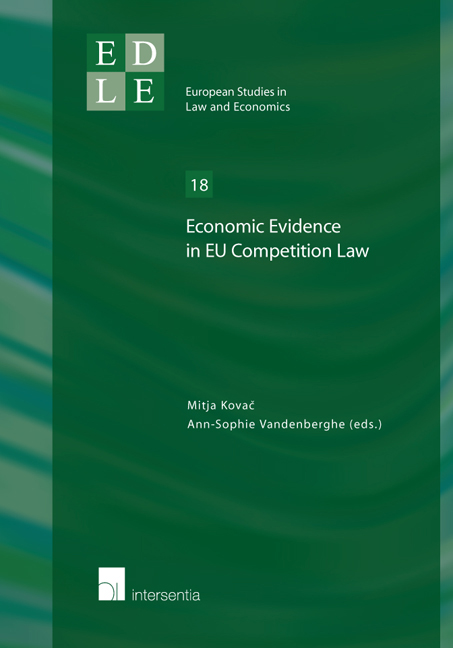Book contents
- Frontmatter
- Dedication
- Preface
- Contents
- List of Contributors
- General Introduction
- PART I ECONOMIC METHODS IN COMPETITION LAW
- PART II ECONOMIC EVIDENCES IN COMPETITION LAW
- PART III INSIDER TRADING, CARTELS AND CRIMINALISATION
- PART IV PRELIMINARY RULINGS AND STATE AID CONTROL
- PART V ECONOMIC EVIDENCE, ENFORCEMENT PROBLEMS AND NATIONAL COURTS
- Index
Preface
Published online by Cambridge University Press: 21 September 2018
- Frontmatter
- Dedication
- Preface
- Contents
- List of Contributors
- General Introduction
- PART I ECONOMIC METHODS IN COMPETITION LAW
- PART II ECONOMIC EVIDENCES IN COMPETITION LAW
- PART III INSIDER TRADING, CARTELS AND CRIMINALISATION
- PART IV PRELIMINARY RULINGS AND STATE AID CONTROL
- PART V ECONOMIC EVIDENCE, ENFORCEMENT PROBLEMS AND NATIONAL COURTS
- Index
Summary
Competition law has formed an important area of European law since the establishment of the European Union. However, the enforcement of EU competition law relies to a great extent on national courts and tribunals which are faced with ever increasing challenging responsibility given the dynamic nature of this area of law. Also the interplay of EC competition law and national law, especially national procedural law and employment of economic evidences, poses them with various challenges. In this light, the aim of this book is to identify practices for coping with these challenges to enable more efficient enforcement and application of EU competition law and also to stimulate transnational processes of mutual judicial-scholarly dialogue.
This book represents a direct outcome of a unique judicial-scholarly-expert research group in competition law and economics bringing together several European judges (from Belgium, Croatia, Czech Republic, Germany, Hungary, Lithuania, The Netherlands, Portugal, Rumania, Slovakia, Slovenia and United Kingdom), experts and selected outstanding scholars which identified the most triggering inefficiencies, problems of the economic evidence in EU competition law enforcement practice in different Member States. T is book represents the outcome of this expert research group, providing a broad assessment of identified problems, inconsistencies, inefficiency, legal practice, cases, application of economic evidence and responding mitigating tools and interpretation techniques.
Contributions cover the most intriguing and challenging issues faced by practitioners and judges enforcing and litigating competition cases throughout the EU Member states (addressing current case law, enforcing practices, standards of proof and current developments in relation to economic evidence). The problem identification comes from judges, national experts and national enforcement authorities (bottom up approach) and reflects real obstacles in current EU competition law practices. Identified obstacles and issues are then addressed in chapters by several outstanding scholars and influential Supreme Court Judges.
This book could not have been made without the enthusiastic collaboration of our authors. They were all wiling to contribute on a relatively short notice for which we are immensely grateful.
- Type
- Chapter
- Information
- Economic Evidence in EU Competition Law , pp. vii - xPublisher: IntersentiaPrint publication year: 2016



